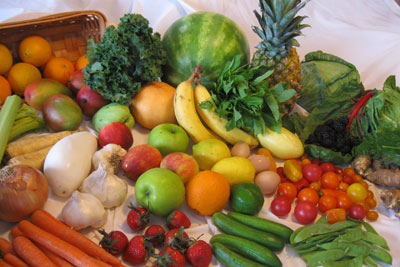What Foods are Good For

Antioxidants
Antioxidants are nutrients, such as Vitamins A, C, and E that limit the
damage that free radicals (molecules with unattached electrons) can do to
human tissue. Antioxidants help prevent heart disease, cancer, reduce
blood pressure, and slow aging. Antioxidants bond to the unattached
electrons and neutralize the oxidative ability of these molecules.
Recommended foods: berries, broccoli, tomatoes, red grapes, carrots,
garlic, spinach, green tea, soy, whole grains
Oils.
Oils
Certain oils are good for certain things. When oils get to the smoking
point, the antioxidants our body needs are molecularly changed into free
radicals and other dangerous molecules. The smoke itself is also highly
toxic. The list below details the best oils for the different types of
preparation. If you want the flavor of an oil in cooked foods, simply add
it before serving.
For baking: Coconut, palm, canola, and high oleic safflower and sunflower
For frying: Avocado, peanut, palm, and sesame
For sautéing: Avocado, canola, coconut, grape seed, olive, sesame and high oleic safflower and sunflower
For dipping, dressings, and marinades: Flax, olive, peanut, toasted sesame or walnut
Think Green
Dark green, leafy vegetables are perhaps the most concentrated source of
nutrition of any food. They are a rich source of minerals, vitamins, and
phytonutrients including beta-carotene, lutein, and zeaxanthin, which
protect our cells from damage and our eyes from age-related problems. They
also contain small amounts of Omega-3 fats.
It's all about color.
It is vital to eat a varied diet of colorful veggies and fruits to balance
our vitamin and mineral intake. Incorporating approximately 60% raw,
plant-based foods is important in insuring that we replenish our bodies
"bank account" of enzymes that are necessary for the proper digestion of
foods. The enzymes are killed off by heat over 112 degrees F and our body
cannot replenish our supply without assistance from the foods we eat.
By Ailment
| Anemia |
Cabbage |
Dates |
Spinach |
|
|
|
|
|
| Arthritis |
Cabbage |
Carrots |
Celery |
Oily Fish |
Onions |
|
|
|
| Asthma |
Garlic |
Kiwi |
Onions |
|
|
|
|
|
| Back Pain |
Cabbage |
Celery |
Oily Fish |
Parsley |
|
|
|
|
| Cattanth |
Cabbage |
Carrots |
Garlic |
Ginger |
Lemons |
Onions |
Spinach |
|
| Child Diseases |
Bananas |
Kiwi |
Oats |
Water |
Whole wheat |
|
|
|
| Circulatory |
Bananas |
Cabbage |
Carrots |
Garlic |
Lemons |
Oats |
Onions |
|
| Colds |
Brazil Nuts |
Garlic |
Ginger |
Lemons |
Onions |
Pumpkin Seeds |
Spinach |
Water |
| Constipation |
Bananas |
Dates |
Garlic |
Kiwi |
Oats |
Water |
Whole wheat |
|
| Coughs |
Garlic |
Ginger |
Lemons |
Onion |
|
|
|
|
| Cystitius |
Celery |
Parsley |
Yogurt |
|
|
|
|
|
| Diabetes |
Oats |
Whole Wheat |
|
|
|
|
|
|
| Diarrhea |
Bananas |
Carrots |
garlic |
water |
yogurt |
|
|
|
| Eczema |
Oily Fish |
Pumpkin Seeds |
Water |
|
|
|
|
|
| Fatigue |
Bananas |
Dates |
|
|
|
|
|
|
| Fluid Retention |
Bananas |
Celery |
Parsley |
Water |
|
|
|
|
| Gastroenteritis |
Bananas |
Water |
|
|
|
|
|
|
| Hay Fever |
Garlic |
Ginger |
Lemons |
Onions |
|
|
|
|
| Headaches |
Ginger |
Oily Fish |
|
|
|
|
|
|
| Heartburn |
Bananas |
Garlic |
Onions |
yogurt |
|
|
|
|
| Indigestion |
Garlic |
Oats |
Whole Wheat |
|
|
|
|
|
| Infection |
Carrots |
Lemons |
Oily Fish |
Spinach |
|
|
|
|
| Infertility |
Bananas |
Carrots |
Lemons |
Oats |
Oily Fish |
Pumpkin Seeds |
Soy Beans |
|
| Insomnia |
Bananas |
Whole Wheat |
|
|
|
|
|
|
| Kidney Problems |
Brazil Nuts |
Celery |
Parsley |
Water |
Whole Wheat |
|
|
|
| Menstrual Problems |
Bananas |
Brazil Nuts |
Oats |
Oily Fish |
Parsley |
Soy Beans |
Whole Wheat |
|
| Nausea |
Bananas |
Ginger |
|
|
|
|
|
|
| Osteoporoses |
Lemons |
Oily Fish |
Soy Beans |
Yogurt |
|
|
|
|
| PMS |
Bananas |
Oats |
Oily Fish |
Pumpkin Seeds |
Whole Wheat |
|
|
|
| Prostate Problems |
Brazil Nuts |
Pumpkin Seeds |
|
|
|
|
|
|
| Rheumatism |
Oily Fish |
Celery |
Parsley |
|
|
|
|
|
| Sinusitis |
Carrots |
Celery |
Garlic |
Ginger |
Lemons |
Onion |
Parsley |
Spinach |
| Sore Throat |
Garlic |
Lemons |
|
|
|
|
|
|
| Thrush |
Dates |
Garlic |
Oily Fish |
Oats |
Parsley |
Pumpkin Seeds |
Whole Wheat |
Yogurt |
| Tonsillitis |
Garlic |
Lemons |
Onions |
Water |
|
|
|
|
| Varicose Veins |
Carrots |
Lemons |
Oats |
Whole Wheat |
|
|
|
|
|











